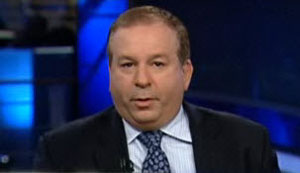 Gluskin Sheff Chief economist David Rosenberg questions who’s going to be the marginal buyer going forward now that the 60%+ bear market rally is running out of steam. According to Rosenberg, institutional investors recognize that the market’s buying power is subsiding and that we’re only going sideways at best.
Gluskin Sheff Chief economist David Rosenberg questions who’s going to be the marginal buyer going forward now that the 60%+ bear market rally is running out of steam. According to Rosenberg, institutional investors recognize that the market’s buying power is subsiding and that we’re only going sideways at best.
“We long maintained that this 60%+ rally from the lows was a bear market rally, and unlike secular bull markets, these are to be rented and not owned. Japan had about a half a dozen of these since its credit collapse began nearly two decades ago. The short-covering was massive and continuous since the government stepped in to effectively draw a line in the sand for big banks, coupled with hedge funds leveraging up again after getting their credit lines re-established and mutual fund managers taking their cash ratios back down to where they were in late 2007.
This buying power seems to now be subsiding; at the same time, insiders have been sellers, the general public have been sellers (the retail investor would never have believed back in March that they would ever have this opportunity to shed their portfolio at a 60% premium, at least this quickly — the rally from the March lows must have felt like winning the lottery or like a religious experience at the very least) and pension funds have been rebalancing towards the fixed-income market of late. It does beg the question, who is the marginal buyer going to be going forward?
Volume is already tapering off as we saw yesterday, an indication that institutional investors now recognize a market that is fully priced or perhaps looking at price/earnings, price/book or price/dividend ratios, more than fully priced. Higher volume losses like we saw yesterday and the large number of ‘distribution days’ accumulated over the past month is very worrisome from a technical perspective. And, any market that can rally more than 60% at the same time the economy sheds three million jobs is a market that was fuelled by technicals, not fundamentals — hence our need to focus at least as much on the former as the latter. And the technical picture right now ain’t lookin’ so pretty.
Here is the big surprise. However the numbers have been cloaked by massive government stimulus that can change the data for some period of time, we will wake up in 2010 and discover that the recession has not ended. This would come as a shock to every Wall Street economist who continues to view the economic backdrop as a cyclical phenomenon as opposed to a secular credit contraction.
Let’s look at the facts:
- At 1,190, the S&P 500 is no higher today than it was on October 14. That was about two months ago.
- The financials are down nearly 10% from the October highs.
- Small caps peaked in mid-October.
- Food/beverage/tobacco, utilities and health care equity groups have been outperforming in the past month.
- Three-month bill yield are 0.04%. (This is not Japan? Really?)”
(emphasis added)
- Bulenox: Get 45% to 91% OFF ... Use Discount Code: UNO
- Risk Our Money Not Yours | Get 50% to 90% OFF ... Use Discount Code: MMBVBKSM
Disclaimer: This page contains affiliate links. If you choose to make a purchase after clicking a link, we may receive a commission at no additional cost to you. Thank you for your support!

Would like David Rosenberg to comment on something. I am a banker and every client I have will tell me inflation is very high and I agree. Property taxes, gas, food, health insurance and all insurance, tuition, food have gone up so much. I would maintain these are heavily regulated or subsidized so we have inflation in an overalll deflationary environment. The problem is it is destroying the middle class. I see it.